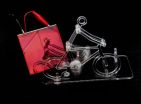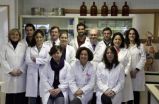(Press-News.org) WASHINGTON, September 2, 2014 — Best-selling author Sam Kean stops by Reactions this week to debunk the myth of the Megalodon, the 50-foot super shark that, despite what "Shark Week" may lead you to believe, is long extinct. Learn all about it at http://youtu.be/KhFygIoW_MA.
Kean's book, "The Disappearing Spoon: And Other True Tales of Madness, Love and the History of the World from the Periodic Table of the Elements," is getting the Reactions treatment in a 10-episode video series produced for the newly launched American Association of Chemistry Teachers (AACT). In this episode, Kean unravels the myth of a living Megalodon, explaining how the element manganese holds the key.
INFORMATION:
To view all 10 episodes of the Disappearing Spoon video series, become an AACT member at http://www.teachchemistry.org.
Subscribe to the series at Reactions YouTube, and follow us on Twitter @ACSreactions to be the first to see our latest videos.
The American Chemical Society is a nonprofit organization chartered by the U.S. Congress. With more than 161,000 members, ACS is the world's largest scientific society and a global leader in providing access to chemistry-related research through its multiple databases, peer-reviewed journals and scientific conferences. Its main offices are in Washington, D.C., and Columbus, Ohio.
To automatically receive news releases from the American Chemical Society, contact newsroom@acs.org.
Follow us: Twitter Facebook
The Disappearing Spoon author Sam Kean takes on the megalodon myth
2014-09-02
ELSE PRESS RELEASES FROM THIS DATE:
Rediscovering our mundane moments brings us unexpected pleasure
2014-09-02
We like to document the exciting and momentous occasions in our lives, but new research suggests there is value in capturing our more mundane, everyday experiences, which can bring us unexpected joy in the future.
"We generally do not think about today's ordinary moments as experiences that are worthy of being rediscovered in the future. However, our studies show that we are often wrong: What is ordinary now actually becomes more extraordinary in the future — and more extraordinary than we might expect," explains psychological scientist and lead researcher Ting Zhang ...
Family conflicts, other non-physical worries before cancer surgery raise patients' complication risk
2014-09-02
ROCHESTER, Minn. — How well patients recover from cancer surgery may be influenced by more than their medical conditions and the operations themselves. Family conflicts and other non-medical problems may raise their risk of surgical complications, a Mayo Clinic study has found. Addressing such quality-of-life issues before an operation may reduce patients' stress, speed their recoveries and save health care dollars, the research suggests. The study specifically looked at colon cancer patients, and found that patients with a poor quality of life were nearly three times likelier ...
Future solar panels
2014-09-02
This news release is available in Spanish.
The solar panels we see tend to be rigid and black. Organic photovoltaic technology, by contrast, enables more translucent and more flexible solar panels in a range of colours to be manufactured. But this technology needs to meet certain requirements if it is to be accepted on the market: greater efficiency, longer duration and low production cost. So this research has set out "to analyse the capacity new materials have to absorb solar energy as well as to seek appropriate strategies to move from the lab to actual operations," ...
Study conducted on rats suggests that hyperproteic diets can be beneficial for bones
2014-09-02
This news release is available in Spanish.
Researchers at the University of Granada have found, through an experiment conducted on rats, that hyperproteic diets could be beneficial for bones, which would be of great use for groups with bone disease problems, such as the elderly or post-menopausic females.
Their research has also revealed that vegetal protein—in the case of the present study, soy protein—is preferable to animal protein (such as whey protein), since the former increased the level of calcium in bones by as much as seven per cent.
In an article published ...
Over-the-counter pain reliever may restore immune function in old age
2014-09-02
New research involving mice suggests that the key to more youthful immune function might already be in your medicine cabinet. In a report published in the Journal of Leukocyte Biology scientists show that macrophages from the lungs of old mice had different responses to Mycobacterium tuberculosis than macrophages from young mice, but these changes were reversed by ibuprofen.
"Inflammation in old age can have significant consequences on immune function," said Joanne Turner, Ph.D., a researcher involved in the work from the Department of Microbial Infection and Immunity ...
Coffee increases prediabetes risk in susceptible young adults
2014-09-02
Barcelona, Spain – Tuesday 2 September 2014: Coffee increases the risk of prediabetes in young adults with hypertension who are slow caffeine metabolisers, according to results from the HARVEST study presented at ESC Congress today by Dr Lucio Mos from Italy. People who drank more than three cups of coffee per day doubled their risk of prediabetes.
Dr Mos said: "Lifestyle factors are very important for the prognosis of young people with hypertension. In a previous analysis of HARVEST (Hypertension and Ambulatory Recording VEnetia STudy) we found that coffee was a risk ...
The Lancet: European Society of Cardiology Congress 2014 media alert
2014-09-02
The Lancet is pleased to announce that the following papers will be published to coincide with presentation at the ESC Congress 2014, taking place in Barcelona, Spain, 30 August – 3 September 2014:
Ultrathin strut biodegradable polymer sirolimus-eluting stent versus durable polymer everolimus-eluting stent for percutaneous coronary revascularisation (BIOSCIENCE): a randomised, single-blind, non-inferiority trial, Windecker et al
Refinements in stent design affecting strut thickness, surface polymer, and drug release have improved clinical outcomes of drug-eluting stents. ...
War between bacteria and phages benefits humans
2014-09-02
BOSTON (September 2, 2014) — In the battle between our immune systems and cholera bacteria, humans may have an unknown ally in bacteria-killing viruses known as phages. In a new study, researchers from Tufts University, Massachusetts General Hospital, Partners In Health, Haiti's National Public Health Laboratory, and elsewhere, report that phages can force cholera bacteria to give up their virulence in order to survive. Importantly, the study — published in eLife — found that cholera's mutational escape from phage predation occurs during human infection.
First author ...
Migrating birds sprint in spring, but take things easy in autumn
2014-09-02
Passerine birds, also known as perching birds, that migrate by night tend to fly faster in spring than they do in autumn to reach their destinations. This seasonal difference in flight speed is especially noticeable among birds that only make short migratory flights, says researcher Cecilia Nilsson of Lund University in Sweden, in Springer's journal Behavioral Ecology and Sociobiology.
Nilsson, in a group led by professor Thomas Alerstam, used a tracking radar to measure over three years the speed by which birds flew over Falsterbo Peninsula, a bird migratory hot spot ...
Nano-forests to reveal secrets of cells
2014-09-02
Vertical nanowires could be used for detailed studies of what happens on the surface of cells. The findings are important for pharmaceuticals research, among other applications. A group of researchers from Lund University in Sweden have managed to make artificial cell membranes form across a large number of vertical nanowires, known as a 'nano-forest'.
All communication between the interior of a cell and its surroundings takes place through the cell membrane. The membrane is a surface layer that holds the cell together and that largely comprises lipids, built of fatty ...






